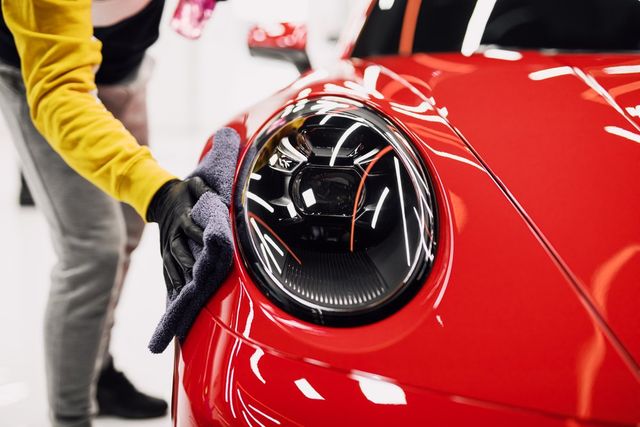Enhance Your Ride’s Aesthetic with Detail'd Luxury Detailing & Coatings for Flawless Results
Enhance Your Ride’s Aesthetic with Detail'd Luxury Detailing & Coatings for Flawless Results
Blog Article
A Comprehensive Overview to Ceramic Covering and Its Duty in Automobile Describing Excellence
In the world of automobile treatment and detailing, ceramic finish has actually become a game-changer. This cutting-edge application, a fluid polymer, forms a resistant, hydrophobic surface area that not only safeguards a lorry from environmental damage yet likewise passes on a striking high-gloss surface. This short article intends to dig right into the science behind ceramic finish, its countless benefits, the application process, and subsequent maintenance pointers - all contributing to automobile detailing excellence.
Recognizing the Essentials of Ceramic Finishing
While it may appear complex initially glance, the fundamentals of ceramic layer are quite simple. Ceramic covering is a liquid polymer that is put on the exterior surfaces of lorries. This finishing, which bonds chemically with the car's factory paint, produces a layer of protection. It is renowned for its capability to give a glossy, top quality surface that is not only aesthetically enticing but also resistant to a selection of potential damages, including scrapes and chips.
This finishing's toughness depends on a number of variables, including the high quality of the item and the problems it is subjected to. Generally, understanding ceramic finishing is regarding understanding its objective, application, and advantages.
The Scientific Research Behind Ceramic Covering and Just How It Functions
Looking into the science behind ceramic finishing, it becomes evident that its effectiveness is due to its unique chemical properties. The finish is made from a compound called silica dioxide, or SiO2, which develops a bond with the vehicle's paint. This bond creates a semi-permanent, tough layer that safeguards the car's surface area.
The nanotechnology entailed enables the ceramic fragments to complete the minute pores of the automobile paint, making the coated surface area hydrophobic, or water repellent. This suggests that water, dust, and other impurities can not stick to the surface area, rather they grain up and roll off.
Additionally, the chemical structure of ceramic layer offers it a high warmth resistance. This makes it extra resistant to the sunlight's UV rays and avoids the car's paint from oxidizing and fading. Recognizing the scientific research behind ceramic finish exposes how this advanced modern technology provides an exceptional level of defense for automobiles.
Advantages of Applying Ceramic Layer to Your Automobile

Ceramic finishing also enhances a vehicle's appearance. It conveys a high-gloss surface that amplifies the cars and truck's shade and total appearances. This covering is hydrophobic, implying it repels water, making it harder for dust and grime to stay with the car's surface. Because of this, cleansing comes to be a less regular and easier job.
Lastly, ceramic layer is a sensible economic decision. It is a lasting investment that raises a car's resale worth by maintaining its pristine condition and magnificent appearance. Unlike wax or sealer, ceramic layer does not call for regular reapplication, making it a cost-efficient remedy.

Step-by-Step Process of Using Ceramic Coating
Using ceramic layer is a careful process that demands mindful precision and interest to information. It begins with a complete cleansing of the vehicle's outside to get rid of any dust or grime. This makes certain a smooth surface area for the covering to adhere to. The next action involves making use of you could check here a clay bar to eliminate any kind of residual contaminants, hence preparing the surface for the application of the finish.
The real ceramic finish application is done utilizing a tiny, soft applicator pad. The finishing is applied evenly throughout the surface, panel by panel, in a cross-hatch pattern. This approach makes sure total protection and harmony. Once applied, the covering is allowed to treat. This process can occupy to 1 day.
This detailed procedure, while time-consuming, is vital to accomplishing the visual and protective benefits of ceramic covering. It boosts the car's look, protects its worth, and guarantees its durability.
Keeping Your Lorry Blog Post Ceramic Coating: Advice
How does one make certain the preservation of a ceramic covering's sparkle and resilience? Post-application upkeep plays a pivotal duty. Ensuring longevity entails normal gentle washing with pH-neutral soaps that won't break down the coating. Avoiding harsh chemicals or unpleasant scrubbing tools is additionally critical.
It is suggested to dry the automobile thoroughly after cleaning to stop water places, which can possibly damage the layer - Detail'd Luxury Detailing & Coatings. Consistently using a top coat sealant can likewise reinforce the finish's sturdiness and heighten the glossy impact
However, the automobile needs to not be subjected to heavy rainfall or other extreme problems instantly after covering application. The coating requires time to heal properly, typically around 48 to 72 hours.
Final Thought
To conclude, ceramic coating offers an innovative method to enhance a vehicle's look while providing durable protection versus ecological damage. It is a critical aspect of auto detailing quality that improves resale value and ensures durability. By recognizing the scientific research, application More Info process, and upkeep demands of ceramic layer, auto enthusiasts can achieve a degree of describing that truly stands the test of time.

Ceramic finishing also boosts an automobile's appearance.In verdict, ceramic coating supplies an innovative method to boost a lorry's look while giving robust protection against environmental damage. By recognizing the science, application procedure, and maintenance requirements of ceramic finish, cars and truck fanatics can accomplish a level of you can try these out outlining that really stands the examination of time.
Report this page